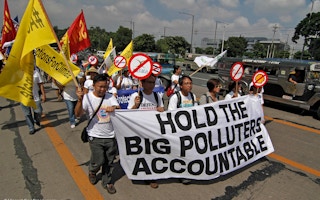Filipino environmentalists lauded the decision made by a court in The Hague this week that will force Shell to make deep emission cuts, hoping it will embolden the Philippines’ Commission on Human Rights to resolve a case filed by typhoon survivors against fossil fuel companies.
The court ordered Shell on Wednesday to reduce its carbon emissions by 45 per cent by 2030 from 2019 levels, in a first of its kind case that legally obliged an oil giant to reduce its environmental footprint.
Almost six years before Wednesday’s ruling, the world’s first national enquiry framing climate change as a human rights issue was filed before the Commission on Human Rights of the Philippines (CHR).
The petition, filed on 22 September 2015, urged the Philippines’ National Commission on Human Rights to investigate 47 companies, including Shell, ExxonMobil, BP, Chevron, ConocoPhillips, Suncor and Repsol, for perpetuating human rights violations by contributing to climate change.
“We hope that the CHR will take this as a cue to release its long-awaited resolution on the role of fossil fuel companies in bringing about the climate crisis and establish their accountability for impinging on the rights of Filipinos, especially those who are most vulnerable to the grave and intensifying impacts of climate change,” said Von Hernandez, global coordinator for Break Free From Plastic, a nonprofit advocating for an end to the plastic crisis.
Hernandez urged the commission to speed up its resolution, saying that further inaction and delay could “effectively translate to condoning the human rights violations being committed on millions of Filipinos by the fossil fuel industry.”
“
We hope that the CHR will take this as a cue to release its long-awaited resolution on the role of fossil fuel companies in bringing about the climate crisis and establish their accountability for impinging on the rights of Filipinos…
Von Hernandez, global coordinator, Break Free From Plastic
Virginia Benosa-Llorin, a campaigner for Greenpeace, said the court ruling brings the Philippines a step closer to attaining climate justice for Filipinos who bear the brunt of decades of fossil fuel consumption.
“This is legal recognition that Shell and other carbon majors’ business model of continued extraction, production and burning of fossil fuels—and their denial of climate science—is costing us lives and livelihoods, and impinges on our most basic rights and dignities as human beings,” she said.
“Following this ruling, we hope to see the immediate release of the resolution to the CHR climate enquiry, which we believe will be another historic precedent that will help end reliance on fossil fuels.”
The petition, filed by typhoon survivors and other communities suffering the impacts of climate change, as well as human rights and environmental groups, asked the commission to investigate the role that the 47 companies played in contributing to natural disasters such as syper-typhoon Haiyan, which devastated the Philippines in 2013 and left more than 6,300 dead.
The commission carried out public hearings in Manila, New York and London as part of its investigations. Several survivors of supertyphoons and severe floods testified on how climate change impacts had upended their lives, livelihood and communities.
Athough CHR commissioner Roberto Cadiz announced on the sidelines of the United Nations climate change conference in Madrid, Spain, on 9 December 2019 that the 47 investor-owned corporations could be sued for human rights harms to Filipinos resulting from climate change, there has been no written resolution.
The report was expected to be finalised by the end of last year, but Cadiz said it was being carefully reviewed before its release because they recognise its importance in “creating a landmark decision that other courts and human rights institutions in and outside the country can utilise.”
CHR resolution: Not legally binding?
Even if the CHR resolution finds that the big fossil fuel firms are accountable for human rights violations due to climate impacts, the commission’s jurisdiction on the case has already been questioned by the accused firms, citing that the issues raised by the organisation are outside its mandate.
Environmental lawyer and former department of environment and natural resources undersecretary Tony La Viña said that although the commission’s decision is “not legally binding and at best has only moral and political significance”, it could lead to civil liabilities that may oblige a guilty party to pay for climate damages.
“The findings in the investigation could be used to determine civil liability in a civil action for loss and damages arising from climate change—whether that action is filed in the Philippines or in another jurisdiction or even with an international tribunal,” La Viña told Eco-Business.
“It’s a good template for other developing counties to follow and could have moral, political and potentially legal value against polluters.”
The 47 companies are not headquartered in the Philippines, although there are some like Shell, Chevron, and Total that have a legal presence in the country.
“The real challenge will be bringing these cases to the courts and proving liability based on proof beyond reasonable doubt that these fossil fuel companies are legally and morally liable for climate impacts on Filipinos,” said environmental law professor Gregorio Bueta.

















